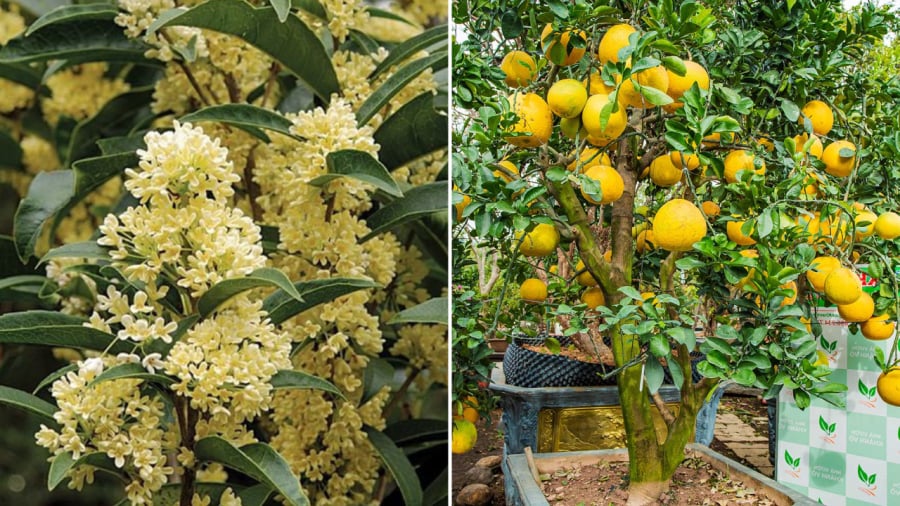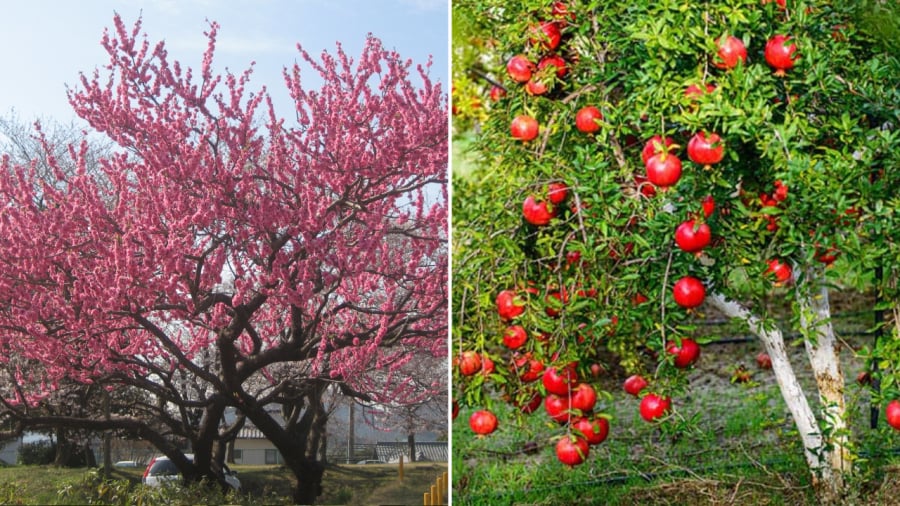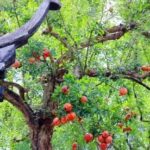Osmanthus Tree
The Osmanthus tree, also known as the cinnamon-flower, cinnamon-scented Osmanthus, or sweet olive tree, is an evergreen with a sweetly fragrant bloom. Every year, around the eighth lunar month, the tree bears golden flowers with a pleasant aroma. Osmanthus flowers come in a variety of colors, including white, yellow, and orange. Not only are they beautiful, but they’re also used for making tea and baking…
The Osmanthus tree is not only grown for its ornamental value but also for its air-purifying properties. In ancient times, it was believed that a flourishing Osmanthus tree symbolized a family’s prosperity.
The Osmanthus is a favored tree in Feng Shui. Planting one in front of your house is said to attract luck and fortune.
In the past, people often planted two symmetrical Osmanthus trees in front of their homes, symbolizing abundant wealth. Additionally, an Osmanthus tree in front of a house was likened to a noble visitor, bringing good news.

The Osmanthus tree and the pomelo tree are both aesthetically pleasing and carry positive Feng Shui meanings.
Pomelo Tree
The pomelo tree is a familiar sight, well-suited to warm climates. It is a cousin to oranges, tangerines, and Buddha’s hand citrus. According to ancient beliefs, the pomelo tree symbolizes luck, wealth, and money, and it also represents family reunion and harmony.
The pomelo tree signifies abundance, good health, and prosperity within a family. Its large, bright yellow fruits are considered auspicious and are often offered at family altars during festive occasions.
Additionally, the pomelo tree boasts lush foliage year-round. Its white flowers exude a pleasant fragrance, creating a comfortable and relaxing atmosphere. Pomelos are a must-have fruit on family altars during Lunar New Year celebrations.
Peach Tree
The peach tree symbolizes prosperity, longevity, good luck, and love. Blooming peach flowers herald the arrival of joy and hope, evoking a sense of warmth and romance.
Since ancient times, people have believed that peach trees can ward off evil spirits and bring health and longevity. As a result, they are often planted in front of houses or in gardens.
Peach blossoms create a stunningly beautiful scene, and the ripe peaches that follow carry a positive meaning, symbolizing abundant wealth.

The peach tree and the pomegranate tree are ideal for planting near the entrance, offering both aesthetic and auspicious Feng Shui values.
Pomegranate Tree
The pomegranate tree is another familiar Feng Shui plant. Its ripe fruits resemble small lanterns, symbolizing luck and good fortune, and bringing a cheerful atmosphere.
Every summer, pomegranate trees burst into bloom, creating a vibrant and warm ambiance. According to Feng Shui principles, planting a pomegranate tree attracts wealth to the home. Specifically, ancient wisdom holds that planting a pomegranate tree in the east brings gold, signifying immense luck and financial prosperity for the family.
Pomegranates also hold a positive meaning, symbolizing a large and prosperous family. In many regions, pomegranate motifs are used to decorate windows and pillows during wedding ceremonies to invite good luck.
According to ancient beliefs, planting a pomegranate tree in front of a house is said to bring wishes of increasing wealth, happiness, and peace to the family.
Information is for reference only.
The Tree of Fortune and Prosperity: Plant This to Bestow Wealth and Peace Upon Your Descendants for Generations
Certain trees possess an extraordinary ability to enhance not just the aesthetic appeal of a living space but also hold profound feng shui significance, attracting prosperity and good fortune. When strategically placed in front of a home, these trees transform into enduring symbols of wealth and peace, bestowing blessings of abundance and harmony upon the residents within.
“4 Things You Should Never Place on Your Balcony: A Superstition That Could Save You From Misfortune”
“Superstition has long played a role in many cultures, and the placement of certain items in the home is no exception. According to ancient wisdom, placing any of the following four items on your balcony can bring bad luck and financial loss to your household. But what are these items, and why do they hold such negative power?”



































